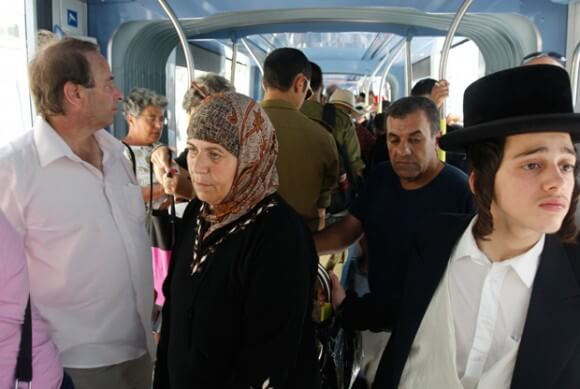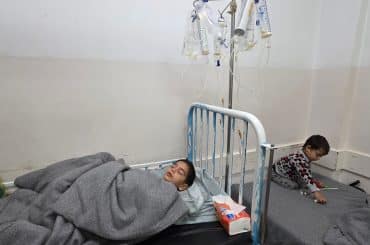
I catch a Palestinian woman making googly eyes at an Israeli baby on the train in Jerusalem. She is at that age when a woman’s body aches with evolutionary desire to reproduce. The effort she expends to restrain herself from tickling the baby’s feet is palpable. The baby’s mother chats in Hebrew with two other Israeli mothers-with-strollers. She doesn’t notice her curly-haired baby exchanging a tender smile with the veiled woman.
Behind them stand a few Orthodox black hats, one wearing iPod earphones. My curiosity burns to know what he is listening to. Although it is the middle of a school day, a Palestinian boy with a schoolbag stands near the door. There is a gentle chime, and the train moves. Smooth. No jerking. A middle-aged Israeli wearing a puffy red winter jacket steadies herself on the metal post, her hand nearly touching that of a Palestinian who looks like a laborer heading to work.
I never take this train, though I’ve long been curious how two peoples, their separation enforced in virtually every other sphere, can share such an intimate area.
The physical space, already constrained, dissolves further as the train takes on passengers on its way to the city center of West Jerusalem. Inexplicably and irrationally, my heartbeat quickens.
“Please remember to take your personal belongings when you depart the train,” the recorded message plays in Hebrew. Then in Arabic. Then in English.
As far as I can tell, the rules that Jerusalem lives by don’t apply on the train. There isn’t a discernable Arab side or an Israeli side. There isn’t a nuanced fight for territory. But is it a neutral zone or a standoff? I can’t tell if these folks have acclimated to this moving, time-limited reality or if a flare-up is imminent.
Palestinians are used to being in spaces defined by others as “not for you,” but how do the Jews feel, I wonder, sealed in such close proximity to Palestinians, a proximity that every Israeli policy aims to prevent?
I don’t have the nerve to ask them. I don’t know what I’m afraid of.
I let my eyes wander to the scene passing by outside the window. As we travel west I notice the buildings get newer and taller. The streets get cleaner. There are bike racks and recycling bins on the sidewalk. There is a sidewalk! Every little while I see an old Arab building, a witness both to the fact that Palestinians were here and the fact that they are no longer here. With weeds growing from cracks in stones, these monuments are romantic in their steadfastness in the center of modernity. Other old Arab buildings, renovated and gentrified, host cafes with fancy signs in English. I imagine their shame.
Inside the train, it is quiet. The occasional sound of Hebrew, nasal and harsh sounding to my ears, seems to rise upon acceleration and fall as the train approaches a station. No one is speaking Arabic out loud, but the physical presence of the veiled women with large shopping bags and young men with dark eyes slouching against the door is unmistakable.
Most of the Palestinians get off at the central bus station.
“He-Haluts Station. Yafeh Nof Station. Mount Herzl Station,” the computer announces in due course. Then, “End of the line. Please exit.”
Somehow, I have missed my stop.
I cross the platform to wait for the train heading back in the direction I came from. I get into the train car with some young Jews, layered hair in degradations of blond. Tourists with water bottles sticking out of backpacks cram in with religious Jewish women donning black skirts below the knee, some sporting black flats, others wearing Addidas knock offs. There are a few soldiers, but no guns. Felt kippas. Knitted kippas. Rainbow kippas. More than one young person clutches a miniature prayer book, lips flying over the words of God.
Realizing this is my chance, I take a deep breath, gather my courage, and start at one end of the train car. “Do you speak English?” A middle-aged Israeli man shakes his head. A younger Israeli man shakes his head before I ask. I sit next to an Israeli man in his twenties. He is eager to talk about the train. I pull out my notebook. “People were angry at first,” he says, “but they got used to it.” “Angry at what?” I ask, surprised to find such easy disclosure. “The traffic, of course,” he clarifies. “Jaffa Street was blocked for so long during the construction. The shop owners said they lost customers.”
“And what about the Arabs?” I ask. “Are people angry because there are Arabs on the train?” (I hear myself avoid saying the word “Palestinian” in favor of the less threatening term, “Arab.”)
For a second he looks surprised by my question, but then he smiles. “Why would they be? Both Jews and Arabs ride bus #19 from the hospital.” (Proving what? I don’t know.) He goes on to say that unlike most Jews, he speaks Arabic. He likes being in a public place where he can hear Arabic.
“I don’t see any Jews talking to Arabs,” I note glancing around. “And the Arabs aren’t even talking to one another,” I point out.
“Well, nobody really talks to anyone on the train,” he admits. “But at least we hear the announcements in Arabic.” As if on cue, the chime rings and the computer voice announces the name of the station, first in Hebrew, then in Arabic.
A Palestinian woman is even more upbeat. “The first time I rode the train it was strange to be so close to Jews. There were some problems. Some Palestinian boys got beat up. But now it’s normal for us to ride together. One time a Jew stood up to give me a seat! There was a Palestinian boy there, and he didn’t get up, but the Jew did.”
I move further down the car and find an Israeli woman. I approach. I sense an invitation to sit next to her. Too late I realize that we were past the Jewish part of town, almost at the entrance to the Palestinian station of Shu’fat. After a few more stops in Palestinian neighborhoods, this train will reach the Israeli settlements that choke Jerusalem. This woman has to be traveling to the settlements. She is a settler. It takes all my nerve to sit next to her and ask her about her experience on the train.
“At the beginning, when it first started operating, the train was too crowded. Now it’s okay.”
“And you don’t mind riding with Arabs?”
“There are security guards at every station in the Arabic neighborhoods,” she says. (I had never noticed that.) “Besides, Arabs are happy to be able to ride to Damascus Gate,” she continues. They wouldn’t jeopardize that by doing something violent. And they are happy because now more Jews shop in Arab neighborhoods.” (I really don’t think that’s true, but I don’t say anything.)
“So you are completely comfortable?” I look around, reminding her that we are traveling through the heart of Palestinian Jerusalem.
“Well…” her voice drops, “…sometimes I do wonder if the little boys that get on the train and run up and down the cars are doing that because they are Arab and want to bother us, or just because they are little boys.”
(I confess. This question has also crossed my mind.)
I sit down at the end of the car to process what I’m learning. Next to me, a Palestinian woman with an unusually fat boy in a stroller reaches her hand across the car to tap an Israeli woman picking up her daughter from a stroller. “What’s her name?” the Palestinian woman asks in broken English. The Israeli woman answers with a mother’s proud smile. It is a French name, I think, but I don’t hear it. “Mine is Odai,” the Palestinian woman offers.
“Odai?”
“Yes, Odai.”
“Bon chance,” the woman says courteously in French.
I’m sitting down, but I feel off balance. Is she not an Israeli? Or is she a French Israeli? For some reason, I feel I must know. I must know who she is or I don’t know who I am.
The Palestinian woman gets up as her stop approaches. She walks out backwards, easing the stroller onto the platform. “Toda raba,” the Palestinian woman says to the (Israeli?) woman in Hebrew, though I don’t know why she is thankful.
I get off at the next stop and watch the silver capsule glide away. No one else seems to find it a bit notable. But I stand a long time trying to figure out what it means to me, to Israelis, to Palestinians, and to prospects for peace with justice. But I can only conclude one thing for sure even if I can’t quite grasp the implications. What I conclude from my foray into ambiguity is this: A stroller can be a powerful thing on the train in Jerusalem.


Bloom where you are planted. :)
Nora making it sound like a ride on the N Train to normalization.
“Behind them stand a few Orthodox black hats, one wearing iPod earphones. My curiosity burns to know what he is listening to.”
Haredim tend to listen the Torah, Hasidic or religious music.
“More than one young person clutches a miniature prayer book, lips flying over the words of God.” Most likely a miniature Psalms.
Thanks for the positive feedback on the experience. What the interviewee meant about the #19 is that Jews and Arabs have been sharing public transportation “without incident” on the buses prior to the advent of the train. You should go to a Jerusalem hospital sometimes (only for a visit, may God keep you from disease), the mixing between Arabs (Palestinians) and Jews is par for the course.
oh wait, are you saying that there is no separate areas for arabs and jews on public transportation ..and they mix together to do their own business..wowwwwww. (sarcasm)